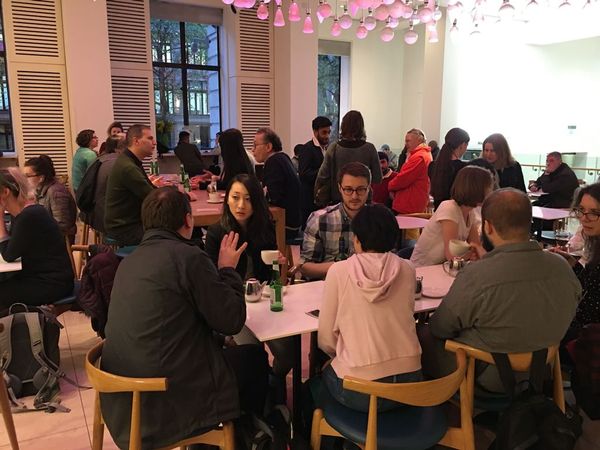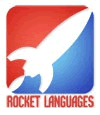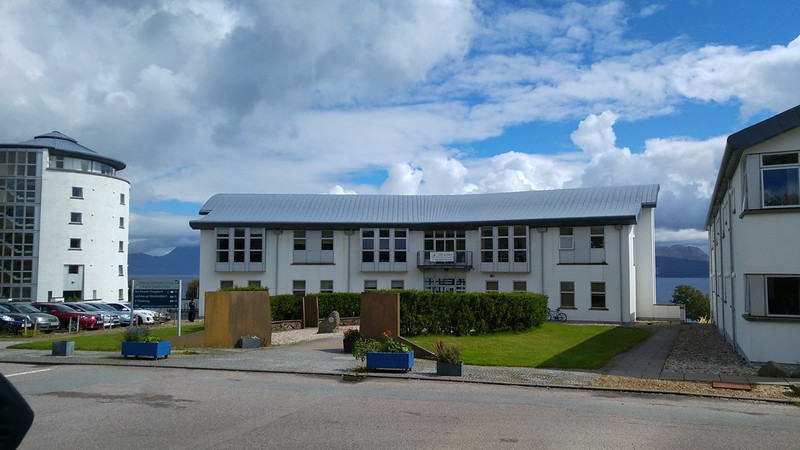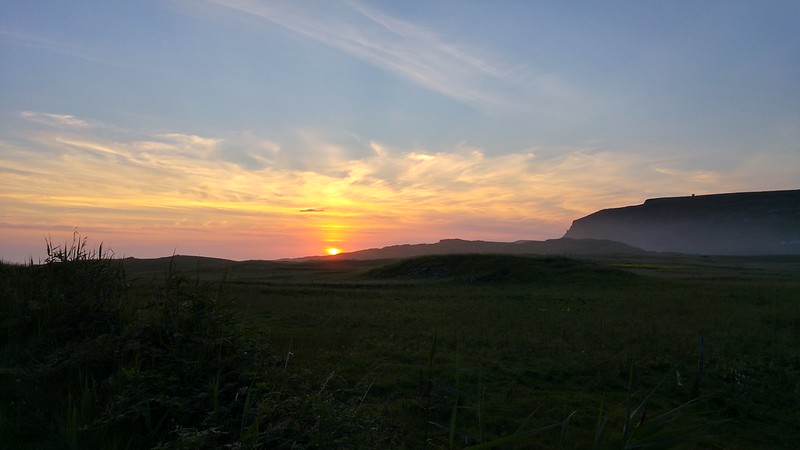| français | English | Cymraeg |
|---|---|---|
| Les couennes de porc frite | pork scratchings | |
| la couenne | rind | crofen; crawen; crafen |
| la peau | hide (skin) | croen |
| le cuir | hide (leather) | lledr; croen |
| seul à seul; face à face | one-to-one | un i un |
| gazouiller; grisoller; roucouler | to warble | telori; trydar |
| fauvette | warbler | telor |
| pour l’amour de Dieu | for heaven’s sake | neno’r nefoedd; er mwyn y nefoedd |
| l’inhalateur (m) | inhaler | ymanadlwr; pwmp |
| inouï | unprecedented; incredible; tremendous | diesiampl; digyffelyb; anhygoel; anghredadwy |
| c’est inouï | that’s unheard of | mae hynny’n anhygoel |
Category: French (français)
Sabhal Mòr Ostaig
I made it to Sabhal Mòr Ostaig last night. It started to rain very heavily as the ferry arrived in Armadale. Fortunately there was a bus to the college, but I got rather damp just walking from the ferry to the bus, and from the bus into the college.
So far on this journey I’ve heard quite a few different languages, including German, Lithuanian, Mandarin, French, Spanish and Dutch. I’ve had conversations in English, Scottish Gaelic and Irish, and spoken odd bits of Manx, Swedish, Russian and German.
My Scottish Gaelic is a bit rusty, but it’s coming back, and I fill in any gaps with Irish. On the way hear I listened to an audio book and some songs in Gaelic to tune my ears into the language.
Turrys foddey / Turas fada / A Long Journey
Last night I arrived safely in Glencolmcille in Donegal in the northwest of Ireland. I left Peel at 8am, went by bus to Ronaldsway airport, flew to Dublin, then took buses all the way to Glencolmcille, arriving just before 8pm, so it took nearly 12 hours.
I met people I know from previous visits to Ireland along the way – at Dublin airport, in Donegal town, and in Killybegs – so the journey didn’t seem quite so long as I had people to talk to. As they say in Irish, bíonn siúlach scéalach (travellers have tales to tell), and giorraíonn beirt bóthar (two people shorten a road).
On the road and after I arrived in Glencolmcille I had conversations in English, Irish, German, Welsh, and spoke odd bits of Russian, French, Romanian, Swedish and Manx.
Today the courses start – there are courses in Irish language, translation, flute and whistle player, and harp playing (that’s the one I’m doing), and also a group going hill walking every day.
There are people here from many countries, including Ireland, the UK, the USA, Australia, France, Belgium, Luxembourg, Finland, Germany, Switzerland, Belarus, Brazil and Slovakia. So I will have plenty of opportunities to practise my languages.
Les mots de la semaine
| français | English | Cymraeg |
|---|---|---|
| la station métérorologique = weather station | gorsaf dywydd | |
| la station balnéaire | seaside resort | tref lan môr |
| la station de ski | ski resort | cyrchfan sgi |
| la station thermale | spa | tref ffynhonnau, sba, ffynhonfa |
| la station de lavage | car wash | golchfa geir, lle golchi ceir |
| l’accord (m) | deal (agreement) | bargen, cynnig |
| hors de portée | beyond/out of reach | allan o gyrraedd, y tu hwnt i’ch cyrraedd |
| à portée (de qn) | within reach (of sb) | o fewn cyrraedd (i rywun) |
| se remettre (de); se rétablir (de) | to recover (from illness) | gwella |
| vertical | vertical | unionsyth, fertigol |
| le kitesurfing | kitesurfing | barcudfyrddio |
| l’élan (m) | elk (European) | elc, cawrgarw |
| l’orignal (m) | moose (Canadian) | elc |
| crise des cinquante | midlife crisis | argyfwng canol oed |
| l’examen | (medical) check up | archwiliad |
| la caisse | crate (for bottles, china) | cawell, bocs rhwyllog, crât, crêt |
| le cageot | crate (for fruit, veg) | cawell, bocs rhwyllog, crât, crêt |
| la vis | screw | sgriw, hoelen |
Harmony-loving chorus
Last night I went to an excellent concert at the Pontio Arts Centre featuring the Royal Liverpool Philharmonic Orchestra and the brilliant harpsichordist, Mahan Esfahani.
As well as enjoying the concert, I started thinking about the word philharmonic – what it means, where it comes from, and why it features in the names of many orchestras.
According to Wiktionary, philharmonic means “appreciative of music, but especially to its performance” or “A full-size symphony orchestra”. It comes from the French, philharmonique, from the Italian filarmonico (loving harmony), from the Greek φίλος (phílos – dear, beloved) + αρμονικός (armonikós – harmonic, harmonious) [source].
The name philharmonic was adopted by the Royal Philharmonic Society, which was established in London on 6th February 1813 by a group of thirty professional musicians. Its aims were to promote performances of instrumental music, and to build an orchestra, which initially played at the Argyll Rooms on Regent Street. Before then there were no permanent orchestras in London. After the Society was formed, other orchestras started to the word philharmonic to their names.
The word orchestra comes from the Greek ὀρχήστρα (orchistra), which was the area in front of the stage in an ancient Greek theatre reserved for the chorus, and comes from the word ὀρχοῦμαι (orkhoûmai – to dance).
The word symphony (an extended piece of music of sophisticated structure, usually for orchestra) comes from the Old French simphonie (musical harmony; stringed instrument), from Latin symphonia (harmony, symphony; a kind of musical instrument), from Ancient Greek συμφωνία (sumphōnía – symphony; a concert of vocal or instrumental music; music; band, orchestra; type of musical instrument), from σῠν- (sun – with, together) + φωνή (phōnḗ – sound) [source].
Les mots de la semaine
| français | English | Cymraeg |
|---|---|---|
| sauter, sautiller, houblonner | to hop | hopian |
| la musaraigne | shrew | chwistlen, chwistl, llygoden goch |
| le rendez-vous | appointment | trefniad |
| le plâtre | plaster cast | cast plastr |
| l’accessoire | feature (of product, computer, etc) | nodwedd |
| la saillie | (mountain) ledge | sil, silff, ysgafell |
| la balançoire | (playground) swing | siglen |
| le toboggan | (playground) slide | sleid, sglefren, sglefr, llithren |
| le toboggan, la luge | toboggan, sledge | sled, tobogan |
| le toboggan de piscine | water slide | sleid ddŵr |
| euthanasier, (faire) piquer, faire abattre | to put down (an animal) | rhoi i gysgu, difa, lladd |
| le fusilier marin | marine (soldier) | môr-filwr |
| le marines | the Marines | y môr-filwyr |
| la rédaction | (school/college) essay | traethawd |
| mettre au lit, coucher | to put to bed | rhoi/dodi yn ei wely |
| tordre, tortiller | to twist | cyfrodeddu, cordeddu, crychu, plethu |
| se tordre le cheville / le poignet | to twist one’s ankle/wrist | troi’ch ffêr/arddwrn |
| la sueur | sweat | chwys |
| suer | to sweat | chwysu |
| le chewing-gun | chewing gum | gwm cnoi |
A Polyglot’s Guide to Place Names of Canada & the United States
Today we have a guest post by Amit Raj
Wherever you find yourself in the States or Canada, you are likely to find most voices around you are speaking in English, French, Spanish, or another modern European language. But dotted among the vocabulary of the typical American will be a number of words that we all profess to understand, without knowing their true meaning: place names!
With their roots in native languages or their meanings and pronunciations altered over the decades and centuries, these often romantic-sounding words instantly conjure a mental picture of lakes, mountains, big cities or sleepy villages, depending on that place’s prevailing image.
Funnily enough, while these place names conjure up such landscapes by association, the original meaning of the names – almost forgotten over time – often refer quite literally to the physical characteristics of the place. For example, the state of Arizona seems to be named for a native word for ‘small spring’ while, within that state, Tucson is a Pima O’odham word meaning ‘black base’ – and no wonder since that city lives in the shadow of nearby Black Mountain.
Meanwhile, the Canadian province of Saskatchewan is quite simply named for the Saskatchewan River that runs across it. That river is in turn named after itself, given that Saskatchewan if a Cree aboriginal word meaning “swift flowing river”.
There are few more pleasurable pastimes for the sworn word addict than tracing the detailed etymology of a curious word or phrase, and the place names of Canada and the United States can become a real wormhole once you get started. This new infographic from Expedia is a great starting point, being as it is a detailed map of the region with informed suggestions on what a number of place names truly mean. Get stuck in, learn a bit about where you’re from, and maybe you’ll even find some conclusions to argue with!
The Literal Translation of Places in Canada & the United States, courtesy of Expedia.ca
Languages of London
Last night I went to the first Languages of London meetup – it’s the same group I’ve been going to for a few months (the Polyglot Pub), but with a new name and venue, and more participants.

The meetup was supposed to take place in the Institute of Education in UCL, which is a good location in central London near Russell Square and Euston. Unfortunately they were closed for the Easter holidays, even though they had confirmed in advance that the venue would be available. So we had to find somewhere else in a hurry. Fortunately we found a good alternative in the café in the nearby Wellcome Collection.
There were more people there last night than have been at any of the Polyglot Pub meetups I’ve been to, from various countries. We chatted about languages, and other things, in a variety of languages, and generally had a good time. I had conversations in English, Welsh, French and Japanese, and spoke odd bits of Spanish and Portuguese. There were also conversations in Mandarin, Arabic, Russian, Thai and a few other languages.
These meetups happen once a month and if you’re in London for the next one. Do come along. They’re for anybody who is learning a language or two, who speaks a few languages, and/or is interested in languages.
Special offer from Rocket Languages

This week Rocket Languges are celebrating their 13th Anniversary with a 4-day sale starting today and continuing until Friday 17th March, or until they’ve sold 1,000 courses.
During this time you can get 60% off any of their online language courses, which include: French, Spanish, Italian, Chinese (Mandarin), German, Japanese, Russian, Arabic, Hindi, ASL, Korean, Portuguese and English (for Spanish or Japanese speakers).
The coupon code to receive the discount is ANNIVERSARY
They also offer online piano courses, in case you fancy a break from your language studies.
I have tried and reviewed their Hindi and Japanese courses, and think they are definitely worth a look. Since then they have added some new languages – Russian and Portuguese – and I’m tempted to try their Russian course, even though I already have plenty of other Russian courses and learning materials. Can you ever have too many language learning materials?
Note: I am a Rocket Languages affiliate, and will receive commission if you buy any of the courses via the links above.
Les mots de la semaine
| français | English | Cymraeg |
|---|---|---|
| le boulon | (nut and) bolt | bollt |
| le boulon à oreilles | wing bolt | bollt adeiniogf/asgellog |
| le verrou | bolt (on door) | bollt(en) |
| verrouiller | to bolt (a door) | bolltio (drws) |
| boulonner | to bolt (on) | bolltio |
| engloutir | to bolt (food) | llowcio/claddu/bolgian bwyd |
| boulotter | to tuck (into smth); to eat | claddu bwyd |
| accordeur de piano | piano tuner | tiwniwr pianos dyn tiwnio pianos |
| accorder | to tune (an instrument) | tiwnio |
| battre un record | to break a record | torri/curo record |
| collant | sticky | gludiog/td> |



